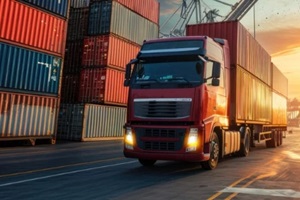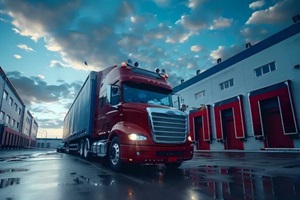
No trucking company can confidently fulfill its clients’ needs without having trucking insurance to cover risks such as cargo damage and property damage caused by its drivers. Trucking company owners, fleet managers, and independent truckers need these essential insurance coverages to operate safely and legally.
But where to begin? While each trucking company differs based on size, driving range, cargo hauled, and more, some types of insurance protection are invaluable regardless of niche.
Here are some primary insurance types that most trucking companies will benefit from, whether hauling furniture or frozen foods.
Liability Coverage For Trucking Insurance
Most trucking businesses must carry liability insurance due to the significant risk these large machines pose to other drivers and their property. Trucking liability insurance covers damage and injuries caused by the truck or the driver.
Some partners will not work with a trucking business whose insurance does not fulfill a minimum level of coverage—typically $1 million per occurrence, often with a higher aggregate. However, many trucking companies seek more coverage than this minimum to protect their investments and defend against potential bills arising from bodily harm, property damage, or legal fees.
This type of protection often pairs with uninsured/underinsured motorist coverage, which addresses instances where a driver is involved in an accident with someone without insurance or insufficient insurance coverage. If the trucking company does not carry sufficient insurance, they can be responsible for paying since the other driver does not have coverage.
Cargo Coverage For Trucking Insurance
Another non-negotiable type of insurance protection for truckers is cargo insurance. Cargo coverage insures freight loss or damage. However, this protection must be customized to suit the type of cargo being hauled. In general, cargo insurance will cover perils such as fire and collisions or accidents that damage the truck’s cargo.
However, trucks transporting temperature-controlled materials may need to pursue an additional type of coverage called reefer insurance to protect against potential malfunctioning of their refrigeration units. Cargo insurance may not cover certain types of cargo (or may need a rider to add them to a policy), such as art, live animals, or explosive materials.
Physical Damage Coverage For Trucking Insurance
Trucks are a significant investment for companies, and it is wise to insure them properly using physical damage insurance. This comprehensive type of protection can address both collision damage and the risks posed by other perils, such as vandalism or arson.
Should a truck suffer a covered peril, the insurance can pay for its repair and necessary replacement where applicable. Some physical damage policies include compensation for lost wages while the truck is out of commission. Still, this type of protection is usually tied to another insurance policy, business interruption coverage.
Bobtail Insurance Coverage
Many truckers operate their vehicles without a load from time to time, either between two deliveries or after having just dropped off their cargo. During this non-dispatched driving, the truck may not be covered by its normal collision coverage and other protections. Some trucking businesses will benefit from bobtail insurance more than others, depending on how often they operate without an attached trailer.
Workers’ Compensation For Trucking Insurance

In many states, trucking companies must purchase a minimum level of coverage in workers’ compensation insurance. This protection safeguards company employees injured on the job, such as during a vehicle accident. It can pay for medical bills and the costs of physical rehabilitation to address the financial impact of acute injuries immediately after an accident and long-term recovery to regain function.
In addition, because truckers likely will not be able to continue working while they recover, workers’ compensation can provide a level of income replacement while they are off work. If a trucking company employee is killed on the job, workers’ compensation can also provide a financial remedy for their family.
Secure Your Trucking Operations with Insurance Coverage by Burton & Company
The trucking industry can be filled with risk. Still, comprehensive, customized insurance coverage can eliminate much of the financial hardship associated with these risks. The experts at Burton & Company work closely with trucking companies to identify their needs and the areas in which they are most vulnerable.
Then, we create a tailored insurance package that keeps your trucking company safe from the financial risks that threaten it. Contact Burton & Company for comprehensive coverage and expert advice, whether you are an interstate hazmat hauler or a small in-state company with minimal cargo needs.

